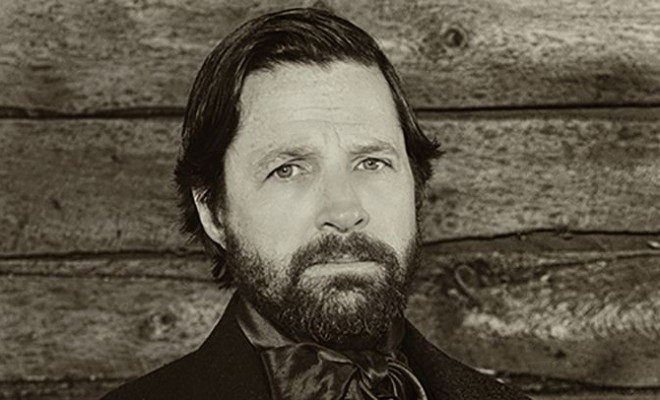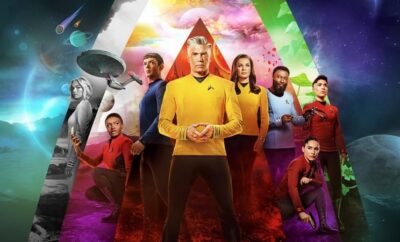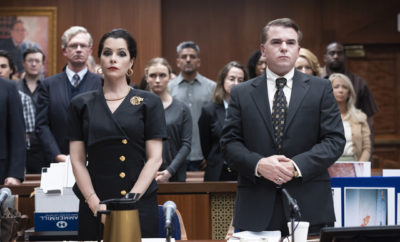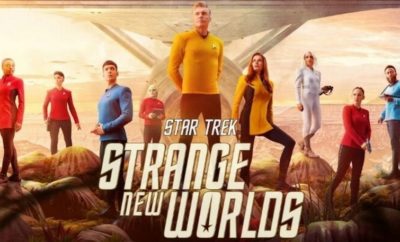
Interviews
Tim Guinee – Hell On Wheels
By: Jamie Steinberg
Q) What are the recent projects that you are working on?
A) Currently, I am shooting the final season of “Hell On Wheels.” There is a movie I’m really proud of called 99 Homes, which comes out this Fall (99 Homes is a thriller set in the tense world of the mortgage crisis. It was directed by Ramin Bahrani and has been garnering an amazing response in the press.). I also have two features I’m trying to get off the ground, which will be projects I’ll direct. Fingers crossed!
Q) How was Collis Huntington originally described to you?
A) I don’t think he was described to me. As I recall, I just got sides to audition from – not even a full script. I don’t even think I knew he was a real person. I think Anson [Mount] was the first to suggest I read Stephen Ambrose’s extraordinary Nothing Like It In The World. It’s a fantastic page-turner on the history of the transcontinental railroad. That has been followed by an avalanche of wonderful books on the man (I’m kind of a research junkie, which is [I think] something of a joke in the writers room.). He was an abolitionist (one story says that he befriended John Brown) who was also a racist. He built the first school for Native Americans and the first school for African Americans after the Civil War. He could be viciously vitriolic about anyone he was in competition with. He loved the expression, “What is good for the railroad is good for America.” I think he believed that with all his heart. He also used it to justify all kinds of terrible things done in the service of building the railroad. While workers were dying in the mud, he built himself colossal mansions in the northeast (one of them was sited where Tiffany’s now stands in New York City). He defrauded the United States government (and its taxpayers) of hundreds of millions of dollars (I want to say $270 million – I can’t even begin to know what that would mean in current valuation). In many ways, he was every bit as much a crook as Durant (Colm Meaney), but Huntington was clever enough not to get caught. He was a great art collector. At the time of his passing, he donated 181 works to the Metropolitan Museum that included works by Vermeer, Rembrandt and Rouseau. He was a great Gordian Knot of contradictions, which as an actor, is a delicious thing to play.
Q) What have you added to the role that wasn’t originally scripted for you?
A) I’m not sure I’ve added anything. The writers on “Hell On Wheels” are the most open, collaborative group of writers I have ever worked with. Anytime I have an idea, I float it with the writers. Sometimes they take my idea whole cloth. Sometimes they toss it out. Often they hear the concern underling my idea and find their own (better) way to resolve that issue. I wouldn’t take any credit because it is a collaborative process with people who are much smarter than I am.
Q) What did you learn about the time period that you may not have been familiar with before filming?
A) I guess the great thing – the thing I really enjoy – is the extraordinary relevance of this period in terms of where we are today in America. The phenomenal disparity in the distribution of wealth, for example, is something completely analogous to our current situation. I honestly do believe that if you understand the history of the building of the transcontinental railroad that you can understand everything about the great genius and terrible flaws of American system. I should add that the story of the railroad gives me great hope. It was an astonishing achievement. It makes me hopeful that we can address the giant challenges of our time – climate change for example.
Q) Collis seems to enjoy having the upper hand on others. What gives him his air of superiority?
A) Well, I think there is something about growing up in poverty that makes Huntington profoundly aware of his status. Profoundly competitive. I think his “air of superiority” comes from the fact that, in his mind, he simply is better than everyone else. This, of course, is mixed with a profound sense of being less than everyone else. A contradiction? Welcome to the world of Collis Huntington.
Q) We frequently see Collis in this large, comfy fur coat. Is that simply for warmth or do you feel it adds to his persona of power/wealth?
A) Both. I think Collis was always aware of trying to have the upper hand. He always had a competitive sense about anyone he would run into on the street. For example, he used fifteen dollar words to shore up the idea of superiority. And he would use anything he could, clothes included, if in his mind it would give him an advantage. So, I am interested in the things that Collis would have that would differentiate him from those around him. There is a prop I used in Episode 303 that is a great example of this. It was a scene where the Chinese workers were boarding the work train. It was pouring rain outside. The prop guys had this fantastic period umbrella. It was both functional and a way to separate Huntington from everyone getting soaked in the rain. (What a burden to have to be better than everyone around him all the time – and yet this seems to be the way Huntington lived his life.)
Q) Who have you not yet worked with or wish you had the opportunity to film more scenes with?
A) This is going to sound like bullshit, like some talk show answer, but I think the ensemble on “Hell On Wheels” is extraordinary and I long to work with everybody I haven’t worked with yet (and I can’t be more specific without giving away plot elements).
Q) What can you tell us have been some of your most memorable moments from filming Season 5 of “Hell On Wheels?”
A) I loved shooting up in the mountains in the show. We got ferried down on snowmobiles at the end of every day. Honestly, the cast and crew are a blast. I always look forward to the days I get to go to work. (Again, I know that sounds like a bullshit talk show answer, but it’s true.)
Q) You are a part of social media. Do you enjoy the instant fan feedback you receive during episodes?
A) Yes, generally I do. Although with one exception: I had been reoccuring on the Showtime series “Homeland” and the network asked me to live tweet with the audience during the show – which I agreed to do. It hadn’t occurred to me that the episode was one in which one of the series beloved, main characters got killed off and the audience was not happy about it at all. And for the Twitter audience, I became the face of Showtime and I got a lot of tweets like, “You suck and so does the show!” That was a long night.
Q) What would you like to say to everyone who is a fan and supporter of you and your work?
A) Oh well, I’m deeply aware of how lucky I am in getting to do the work that I do. It is work I really love doing. I deeply appreciate the kind support from folks over the ears. It is buoying. So, I have great gratitude.





You must be logged in to post a comment Login